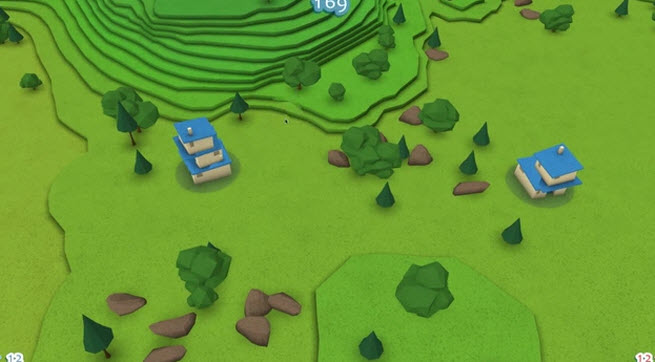Audience question: You mentioned impatience as a big motivator for people spending money. You said you had a different way of doing that. Could you give an example of what that looks like?
Molyneux: That’s hard to do because one of the things we’re not doing quite yet is talking about monetization. Suffice to say that I think you can’t layer in monetization all at once. It gets on my nerves. For example, in Dungeon Keeper — not that I’m knocking it — one of the first things I did with one of my imps is start mining out a block that took two days. It’s just madness.
The first thing you’ve got to do is be subtle about it. You’ve got to take them through the vegetable aisle and then slowly layer in those mechanics. The word I want to use is, we should tempt people to think about being proud about investing.
The big problem with monetization is that it’s actually a cheat. If I’m playing whatever game, whether it’s Candy Crush or Clash of Clans, and I spend money while I’m playing with a friend at the same level, they’ll turn around and say, “You cheating bastard. You just spent loads of money.” That’s the wrong way to get consumers into that. If you can find a way — and without showing it to you it’s hard to name it — that it isn’t empirically a cheat…. Say my hobby is cooking, and I buy a new kitchen knife. I’m not cheating at cooking. It’s just a way of enhancing my cooking.
We’ll be showing all this stuff very soon, hopefully, when Godus goes into the gamma release. You’ll see that stuff then.
Audience question: Is there any place you’re thinking out loud about this kind of thing, so we can read up on this stuff? Is there an exchange about this all happening somewhere?
Molyneux: Not that I know of. But what we’ve done in the game industry, and what we must continue to do, is that we can’t just sit down. It aggravates me when people say, “Oh, we know how to do free to play now.” You know the idea’s wrong, by the way, when it’s got too many acronyms involved. “It’s your ARPPU [average revenue per paying user] multiplied by DAU [daily active users] by retention rate….” I feel like going crazy. No. What you’re doing to your consumers is training them not to spend money. You’re burning through them.
Maybe this is me being crazy and hippie-ish, but any game that makes its money out of its five-percent whales — which is hardly a complimentary term, by the way — who spend hundreds of pounds on features that don’t really add to their gaming experience is ultimately doomed to failure. These games are making millions of pounds, but they’re burning through consumers. They leak like a sieve.
What it ultimately means is that we as an industry have to continue to invent. We have to continue to realize that we want people to make this their hobby. We have a chance to truly be the thing which we’ve thought we are for countless years now. We have this stat, which is that we’re bigger than the movie industry and the TV industry combined. That’s bollocks. In terms of money, yes, because we’re greedy fat pigs who take as much money out of consumers as we can. “You want to play our game? Pay us 50 pounds.” And now we’re saying, “You want to play our game? Learn to be patient or pay us 100 pounds.”
We haven’t got millions of people as the movie industry has. We aren’t a culturally significant thing like that industry. But we can be. That’s what I find so fascinating. Personally, I love this industry. It’s an honor to be in this industry. I’m excited about what’s going to happen over the next five years.
GamesBeat: I listened to attorney Paul Gardner talk about the coming regulation of virtual goods. It sounded like they’re going to make a lot of the things you were talking about illegal. Quick-monetization schemes are going to disappear.
Molyneux: It’s inevitable, absolutely inevitable. We as an industry are being incredibly crude about our approach to this. We’re asking governments to turn on us. Do you really think we can get away with kids spending thousands of dollars on a game? We’re asking to be regulated. You can’t fund a game with a business model that relies on a tiny percentage of its consumers spending vast amounts of money. It’s begging governments to legislate against that.
We should constrict that. We should be responsible with those people. We shouldn’t allow people to spend that much money. It’s not right. It’s not fair. It’s treating consumers like addicts. It started in Japan, with the complete gacha mechanics. That’s spreading inevitably to the West. If we’re not careful, we wind up in an over-regulated environment, much like the gambling industry, where you have to go through unbelievably strict ways of monetizing with consumers.



